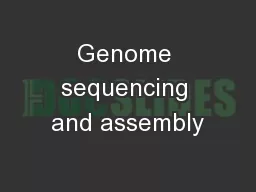PDF-Whole genome sequencing
Author : elyana | Published Date : 2022-09-23
for suspected cancer Information for patients and family members Genomic Medicine Service NHS What is your genome Your genome is the information needed to build
Presentation Embed Code
Download Presentation
Download Presentation The PPT/PDF document "Whole genome sequencing" is the property of its rightful owner. Permission is granted to download and print the materials on this website for personal, non-commercial use only, and to display it on your personal computer provided you do not modify the materials and that you retain all copyright notices contained in the materials. By downloading content from our website, you accept the terms of this agreement.
Whole genome sequencing: Transcript
Download Rules Of Document
"Whole genome sequencing"The content belongs to its owner. You may download and print it for personal use, without modification, and keep all copyright notices. By downloading, you agree to these terms.
Related Documents














